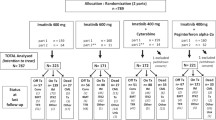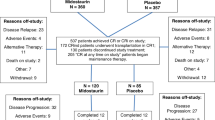Abstract
Two hundred eighty-five patients, median age 42, with PML-RARα-positive acute promyelocytic leukaemia were randomised to Ara-C-containing ‘Medical Research Council (MRC) Chemotherapy’+ATRA (All-trans-retinoic acid) or anthracycline+ATRA (modified ‘Spanish’) therapy. MRC treatment comprised four courses with ATRA in courses 1–2. Spanish treatment comprised four anthracycline-based courses with ATRA in courses 1–3. In course 3 patients were randomised to gemtuzumab ozogamicin (GO) or not. The Spanish arm received 24-month maintenance. Patients were sequentially molecularly monitored. Quality of life was assessed at baseline, 3, 6, 9, 12, 24 months. Remission rates were similar in both arms (93%): cumulative incidence of haematological relapse (CIHR) was 6% at 5 years; 5 patients relapsed molecularly. Survival post relapse was 80%. There were more deaths in remission in the MRC arm (4% vs 10%: P=0.2). The overall 5-year relapse-free and overall survival was similar between arms (81% vs 82% and 84% vs 83%, respectively). More supportive care and hospitalisation (81.8 vs 63 days, P<0.0001) was required in the MRC arm. GO did not provide benefit. High white blood cell count (>10 × 109/l) was not prognostic overall, or within treatment arms. Both approaches deliver similar results with minor differences in quality of life. MRC treatment required more hospitalisation. This suggests that additional chemotherapy, Ara-C in particular, is not required.
This is a preview of subscription content, access via your institution
Access options
Subscribe to this journal
Receive 12 print issues and online access
$259.00 per year
only $21.58 per issue
Buy this article
- Purchase on Springer Link
- Instant access to full article PDF
Prices may be subject to local taxes which are calculated during checkout





Similar content being viewed by others
References
Lo-Coco F, Avvisati G, Vignetti M, Breccia M, Gallo E, Rambaldi A et al. Front-line treatment of acute promyelocytic Leukemia with AIDA induction followed by risk-adapted consolidation: results of the AIDA-2000 Trial of the Italian GIMEMA Group. Blood 2010; 116: 3171–3179.
Sanz MA, Martin G, Rayon C, Esteve J, Gonzalez M, Diaz-Mediavilla J et al. A modified AIDA protocol with Anthracycline-based consolidation results in high antileukemic efficacy and reduced toxicity in newly diagnosed PML/RARa- positive acute promyelocytic leukemia. Blood 1999; 94: 3015–3021.
Fenaux P, Le Deley MC, Castaigne S, Archimbaud E, Chomienne C, Lisk H et al. Effect of all trans retinoic acid in newly diagnosed acute promyelocytic leukemia: results of a multicenter randomized trial. Blood 1993; 82: 3241–3249.
Tallman MS, Anderson JW, Schiffer CA, Appelbaum FR, Feusner JH, Ogden A et al. All- transretinoic acid in acute promyelocytic leukemia. New Engl J Med 1997; 337: 1021–1028.
Burnett AK, Grimwade D, Solomon E, Wheatley K, Goldstone AH . Presenting white cell count and kinetics of molecular remission predict prognosis acute promyelocytic leukaemia treated with All-transretinoic acid: result of the randomised MRC Trial. Blood 1999; 93: 4131–4143.
Fenaux P, Chastang C, Cherzet S, Sanz M, Dombret H, Archimbaud E et al. A randomized comparison of ATRA followed by chemotherapy and ATRA plus chemotherapy and the role of maintenance treatment in APL. Blood 1999; 94: 1192–1200.
Avvisati G, Lo-Coco F, Paoloni FP, Petti MC, Diverio D, Vignetti M et al. AIDA 0493 protocol for newly diagnosed acute promyelocytic leukemia: very long-term results and role of maintenance. Blood 2011; 117: 4716–4725.
Asou N, Kishimoto Y, Kiyoi H, Okada M, Kawai Y, Tsuzuki M et al. A randomized study with or without intensified maintenance chemotherapy in patients with acute promyelocytic leukemia who have become negative for PML-RARalpha transcript after consolidation therapy: the Japan Adult Leukemia Study Group (JALSG) APL97 study. Blood 2007; 110: 59–66.
Grimwade D, Jovanovic JV, Hills RK, Nugent EA, Patel Y, Flora R et al. Prospective minimal residual disease monitoring to predict relapse of acute promyelocytic leukemia and to direct pre-emptive arsenic trioxide therapy. J Clin Oncol 2009; 27: 3650–3658.
Cheson BD, Bennett JM, Kopecky KJ, Buchner T, Wilman CL, Estey EH et al. Revised recommendation of the International Working Group for diagnosis standardisation, of response criteria treatment outcomes and reporting standards for therapeutic trials in acute myeloid leukaemia. J Clin Oncol 2003; 21: 4642–4649.
Powell BL, Moser B, Stock W, Gallagher RE, Willman CL, Stone RM et al. Arsenic trioxide improves event-free and overall survival for adults with acute promyelocytic leukemia: North American Leukemia Intergroup Study C9710. Blood 2010; 116: 3751–3757.
Park JH, Qiao B, Panageas KS, Schymura MJ, Jurcic JG, Rosenblat TL et al. Early death rate in acute promyelocytic leukemia remains high despite all-trans retinoic acid. Blood 2011; 118: 1248–1254.
McClellan JS, Kohrt HE, Coutre S, Gotlib JR, Majeti R, Alizadeh AA et al. Treatment advances have not improved the early death rate in acute promyelocytic leukemia. Haematologica 2012; 97: 133–136.
Sanz M, Grimwade D, Tallman MS, Lowenberg B, Fenaux P, Estey EH et al. Management of acute promyelocytic leukemia: recommendations from an expert panel on behalf of the European LeukemiaNet. Blood 2009; 113: 1875–1891.
Ades L, Chevret S, Raffoux E, Botton Sde, Guerci A, Pigneux A et al. Is cytarabine useful in the treatment of acute promyelocytic leukemia? Results of a randomized trial from the European Acute Promyelocytic Leukemia Group. J Clin Oncol 2006; 24: 5703–5710.
Shen ZX, Shi ZZ, Fang J, Gu BW, Li JM, Zhu YM et al. All-trans retinoic acid/As2O3 combination yields a high quality remission and survival in newly diagnosed acute promyelocytic leukemia. Proc Natl Acad Sci USA 2004; 101: 5328–5335.
Mathews V, George B, Lakshmi KM, Viswabandya A, Bajel A, Balasubramanian P et al. Single-agent arsenic trioxide in the treatment of newly diagnosed acute promyelocytic leukemia: durable remissions with minimal toxicity. Blood 2006; 107: 2627–2632.
Estey E, Garcia-Manero G, Ferrajoli A, Faderl S, Verstovsek S, Jones D et al. Use of all-trans retinoic acid plus arsenic trioxide as an alternative to chemotherapy in untreated acute promyelocytic leukemia. Blood 2006; 107: 3469–3473.
Ravandi F, Estey E, Jones D, Faderl S, O'Brien S, Fiorentino J et al. Effective treatment of acute promyelocytic leukemia with all-trans-retinoic acid, arsenic trioxide, and gemtuzumab ozogamicin. J Clin Oncol 2009; 27: 504–510.
Lo Coco F, Diverio D, Avvisati G, Petti MC, Meloni G, Pogliani EM et al. Therapy of molecular relapse in acute promyelocytic leukemia. Blood 1999; 94: 2225–2229.
Esteve J, Escoda L, Martin G, Rubio V, az-Mediavilla J, Gonzalez M et al. Outcome of patients with acute promyelocytic leukemia failing to front-line treatment with all-trans retinoic acid and anthracycline-based chemotherapy (PETHEMA protocols LPA96 and LPA99): benefit of an early intervention. Leukemia 2007; 21: 446–452.
Acknowledgements
We thank the physicians, nurses and pharmacists who contributed to this study; Wyeth Research for the provision of gemtuzumab ozogamicin and to the Birmingham Clinical Trials Unit for supporting the trial, to the UK Medical Research Council for providing research support, and to Leukaemia & Lymphoma Research for supporting molecular diagnostics and MRD monitoring.
Author information
Authors and Affiliations
Consortia
Corresponding author
Ethics declarations
Competing interests
A K Burnett has received trial funding from Pfizer and has served on Advisory Boards for Pfizer.
Additional information
Supplementary Information accompanies the paper on the Leukemia website
Supplementary information
Rights and permissions
About this article
Cite this article
Burnett, A., Hills, R., Grimwade, D. et al. Inclusion of chemotherapy in addition to anthracycline in the treatment of acute promyelocytic leukaemia does not improve outcomes: results of the MRC AML15 trial. Leukemia 27, 843–851 (2013). https://doi.org/10.1038/leu.2012.360
Received:
Revised:
Accepted:
Published:
Issue Date:
DOI: https://doi.org/10.1038/leu.2012.360
Keywords
This article is cited by
-
Therapie der akuten Promyelozytenleukämie
InFo Hämatologie + Onkologie (2022)
-
Phase I clinical trial repurposing all-trans retinoic acid as a stromal targeting agent for pancreatic cancer
Nature Communications (2020)
-
Predictors of early death, serious hemorrhage, and differentiation syndrome in Japanese patients with acute promyelocytic leukemia
Annals of Hematology (2020)
-
Acute Promyelocytic Leukemia: A History over 60 Years—From the Most Malignant to the most Curable Form of Acute Leukemia
Oncology and Therapy (2019)
-
Characteristics and outcome of patients with therapy-related acute promyelocytic leukemia front-line treated with or without arsenic trioxide
Leukemia (2017)



